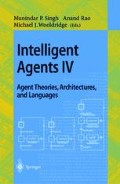Abstract
Many autonomous agents operate in domains in which the cooperation of their fellow agents cannot be guaranteed. In such domains negotiation is essential to persuade others of the value of co-operation. This paper describes a general framework for negotiation in which agents exchange proposals backed by arguments which summarise the reasons why the proposals should be accepted. The argumentation is persuasive because the exchanges are able to alter the mental state of the agents involved. The framework is inspired by our work in the domain of business process management and is explained using examples from that domain.
On sabbatical leave from IIIA† thanks to a Spanish MEC grant PR95-313. Research partially supported by the Spanish CICYT project SMASH, TIC96-1038-C04001.
On leave from Laboratorio Nacional de Informática Avanzada -LANIA. Rébsamen, 80; Xalapa, Veracruz, Mexico. Enjoying a Mexican CONACYT grant [69068-7245].
Preview
Unable to display preview. Download preview PDF.
References
S. Benferhat, D. Dubois, and H. Prade. Argumentative inference in uncertain and inconsistent knowledge bases. In Proc 9th Conf on Uncertainty in AI, pages 411–419, Washington, USA, 1993.
C. Castelfranchi. Social Power: A Point missed in Multi-Agent, DAI and HCI. In Y Demazeau and J. P. Müller, editors, Decentralised AI, pages 49–62. Elsevier, 1990.
P. M. Dung. On the acceptability of arguments and its fundamental role in nonmonotonic reasoning, logic programming and n-person games. Artificial Intelligence, 77:321–357, 1995.
P. Gardenfors. Knowledge in Flux. MIT Press, Cambridge, MA, 1987.
F. Giunchiglia and L. Serafini. Multilanguage hierarchical logics (or: How we can do without modal logics). Artificial intelligence, 65:29–70, 1994.
W. D. Goldfarb. The undecidability of the second-order unification problem. Theoretical Computer Science, 13:225–230, 1981.
T. R. Gruber. The role of common ontology in achieving sharable, reusable knowledge bases. In J. A. Allen, R. Fikes, and E. Sandewall, editors, Proc. of the Second Int. Conf. on Principles of Knowledge Representation and Reasoning, San Mateo, CA, 1991. Morgan Kaufman.
N. R. Jennings, P. Faratin, M. J. Johnson, T. J. Norman, P. O'Brien, and M. E. Wiegand. Agent-based business process management. International Journal of Cooperative Information Systems, 5(2&3):105–130, 1996.
M. Karlins and H. I. Abelson. Persuasion. Crosby Lockwood & Son, London, UK, 1970.
S. Kraus, M. Nirkhe, and K. Sycara. Reaching agreements through argumentation: a logical model (preliminary report). In DAI Workshop'93, pages 233–247, Pensylvania, USA, 1993.
S. Kraus, J. Wilkenfeld, and G. Zlotkin. Multiagent negotiation under time constraints. Artificial Intelligence, 75:297–345, 1995.
P. Noriega and C. Sierra. Towards layered dialogical agents. In Proceedings of the ECAI'96 Workshop Agents Theories, Architectures and Languages, ATAL'96, number 1193 in LNAI, pages 157–171. Springer, 1996.
S. Parsons and N. R. Jennings. Negotiation through argumentation—a preliminary report. In Proc. Second Int. Conf. on Multi-Agent Systems, ICMAS'96, pages 267–274, Kyoto, Japan, 1996.
A. S. Rao and M. P. Georgefff. BDI agents: From Theory to Practice. In Proc 1st Int Conf on Multi-Agent Systems, pages 312–319, San Francisco, USA, 1995.
C. Sierra, P. Faratin, and N. R. Jennings. A service-oriented negotiation model between autonomous agents. In MAAMAW'97, pages 17–35, Ronneby, Sweden, 1997.
R. G. Smith and R. Davis. Frameworks for cooperation in distributed problem solving. IEEE Trans on Systems, Man and Cybernetics, 11(1):61–70, 1981.
J. S.Rosenschein and G. Zlotkin. Rules of Encounter. The MIT Press, Cambridge, USA, 1994.
K. P. Sycara. Persuasive argumentation in negotiation. Theory and Decision, 8:203–242, 1990.
D. N. Walton. Informal Logic. Cambridge University Press, Cambridge, UK, 1989.
Author information
Authors and Affiliations
Editor information
Rights and permissions
Copyright information
© 1998 Springer-Verlag Berlin Heidelberg
About this paper
Cite this paper
Sierra, C., Jennings, N.R., Noriega, P., Parsons, S. (1998). A framework for argumentation-based negotiation. In: Singh, M.P., Rao, A., Wooldridge, M.J. (eds) Intelligent Agents IV Agent Theories, Architectures, and Languages. ATAL 1997. Lecture Notes in Computer Science, vol 1365. Springer, Berlin, Heidelberg. https://doi.org/10.1007/BFb0026758
Download citation
DOI: https://doi.org/10.1007/BFb0026758
Published:
Publisher Name: Springer, Berlin, Heidelberg
Print ISBN: 978-3-540-64162-9
Online ISBN: 978-3-540-69696-4
eBook Packages: Springer Book Archive

